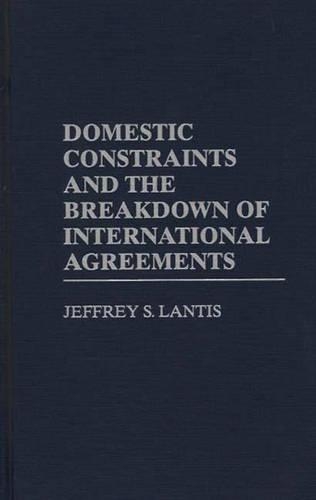
Domestic Constraints and the Breakdown of International Agreements
(Hardback)
Publishing Details
Domestic Constraints and the Breakdown of International Agreements
By (Author) Jeffrey Lantis
Bloomsbury Publishing PLC
Praeger Publishers Inc
28th October 1997
United States
Classifications
Tertiary Education
Non Fiction
Political science and theory
327.4304
Physical Properties
Hardback
256
Description
This book explores how elite commitments to cooperate with international organizations can be supplanted by domestic political constraints. It contends that the most popular explanation for defections from international commitments in the foreign policy analysis literature, the two-level game model presented by Robert Putnam, does not fully account for surprising defections from agreements. A new framework is presented which interprets international defections as the product of domestic constraints on foreign policy-making that often materialize in the post-commitment ratification process, the period when domestic conditions and actors align relative to an international agreement. To explore the dynamics of post-commitment politics, eight cases studies of the foreign policy decision-making process in the Federal Republic of Germany relative to commitments to the European Community and NATO in the 1970s and 1980s are presented. A comparative analysis of the cases demonstrates the importance of modifying the two-level game model to account for the sequential and complex nature of the ratification process in the post-commitment phase. The study concludes that factionalism in the major party government and inter-party coalition differences are primary, but often hidden, constraints on a leader's ability to uphold international agreements, and it shows how international commitments can awaken dormant domestic constituencies along the road to ratification. This is a work of great significance to scholars and researchers in the areas of foreign policy analysis, international organizations, and German politics.
Reviews
In his skillful analysis of the internal political struggles in West Germany and the factors affecting the ultimate decisions for or against NATO and EC policies, Lantis sketches a fascinating history of differences and similarities in German governments, majority parties, ruling coalitions, and heads of government from Willy Brandt and Helmt Schmidt to Helmut Kohl....While this well researched, persuasively reasoned, and well written book is of special interest to students of international relations, I recommend it to the interested general audience as well.-Political Science Quarterly
The book is essentially sound in its relatively unexceptional conclusions, and the research design is generally well done....If one is interested in learning about selected issues in German foreign policy and politics for the period under consideration, the book is adequate.-The International History Review
"The book is essentially sound in its relatively unexceptional conclusions, and the research design is generally well done....If one is interested in learning about selected issues in German foreign policy and politics for the period under consideration, the book is adequate."-The International History Review
"In his skillful analysis of the internal political struggles in West Germany and the factors affecting the ultimate decisions for or against NATO and EC policies, Lantis sketches a fascinating history of differences and similarities in German governments, majority parties, ruling coalitions, and heads of government from Willy Brandt and Helmt Schmidt to Helmut Kohl....While this well researched, persuasively reasoned, and well written book is of special interest to students of international relations, I recommend it to the interested general audience as well."-Political Science Quarterly
Author Bio
JEFFREY S. LANTIS is Chair of the International Relations Program and Assistant Professor of Political Science at The College of Wooster. He was Associate Editor for The Brassey's Mershon American Defense Annual, 1995-1996, and he has written extensively on German and American foreign policy and the use of simulations in the international relations classroom.
